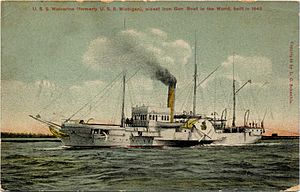Great Lakes Patrol facts for kids
Quick facts for kids Great Lakes Patrol |
|
|---|---|
 A postcard of USS Michigan after her name was changed to USS Wolverine in 1905 |
|
| Objective | Suppress crime on the Great Lakes and protect the maritime border with Canada. |
| Date | 1844–1920 |
| Executed by | |
The Great Lakes Patrol was a special operation carried out by American naval forces. It started in 1844 and lasted for many years. The main goal was to stop criminal activities and protect the water border with Canada on the Great Lakes.
A small group of ships from the United States Navy, the Coast Guard, and the Revenue Service worked together. They sailed the Great Lakes to keep the peace. Over the years, they faced several challenges, including dealing with pirates and rebels.
The Great Lakes Patrol officially ended in 1920. At that time, the US Coast Guard took over all the operations. This new effort became part of the Rum Patrol. It was started during the Prohibition era, a time when alcohol was illegal in the United States. The goal was to stop people from smuggling alcohol from Canada across the lakes and rivers. This was a very tough job because the border between Canada and the United States is incredibly long, stretching for 8,891 kilometers (5,525 miles)!
Contents
Protecting the Great Lakes
The Great Lakes are a huge system of freshwater lakes in North America. They are shared by the United States and Canada. Because of their size and location, these lakes have always been important for shipping and trade. They also formed a long border that needed to be watched.
Why the Patrol Started
The Great Lakes Patrol began in 1844. The United States government wanted to make sure the lakes were safe. They needed to stop illegal activities that could happen on the water. This included things like smuggling and other crimes. It was also important to protect the border with Canada.
Who Was Involved
Several different groups helped with the patrol:
- The United States Navy: These were the main naval forces.
- The United States Revenue Cutter Service: This group was like an early version of the Coast Guard. They focused on stopping smuggling and collecting taxes.
- The United States Coast Guard: Later, this service became very important in patrolling the lakes.
These groups worked together to keep the waters safe. They used various ships to patrol the vast lakes.
Challenges on the Lakes
Life on the Great Lakes during the patrol was not always calm. The forces involved faced many challenges. They had to deal with different kinds of threats on the water.
Dealing with Pirates
Even on the Great Lakes, there were sometimes pirates! These were not the pirates you might imagine from old stories with treasure maps. Instead, they were criminals who would rob ships or engage in other illegal acts on the water. The patrol's job was to catch these lawbreakers and keep shipping safe.
Facing Rebels
At different times, the patrol also had to deal with rebels. These were groups who might try to cause trouble or cross the border illegally. The patrol helped to maintain order and prevent conflicts from spreading across the lakes. Their presence helped to keep the peace along the border.
The End of an Era
The Great Lakes Patrol continued for many decades, adapting to new challenges. Its long history showed how important it was to keep the lakes secure.
The Rise of the Rum Patrol
In 1920, the Great Lakes Patrol officially ended. Its duties were then taken over by the US Coast Guard. This change happened because of a new law in the United States called Prohibition. During Prohibition, it was illegal to make, sell, or transport alcohol.
This led to a lot of alcohol smuggling, especially from Canada. The new mission for the Coast Guard on the lakes became known as the "Rum Patrol." Their main job was to stop people from bringing illegal alcohol into the country. This was a huge task because of the very long and often unguarded border.
The history of the Great Lakes Patrol shows how important it was to protect the waters and borders of the United States. It highlights the work of brave sailors and officers who kept the lakes safe for many years.
Images for kids


